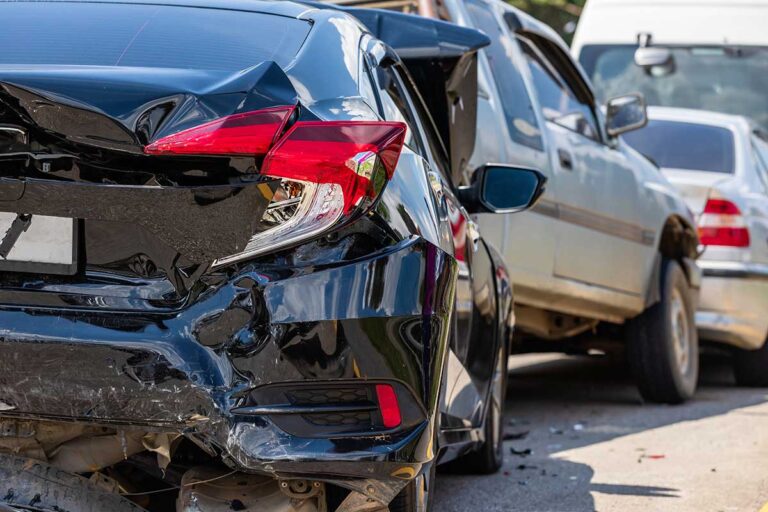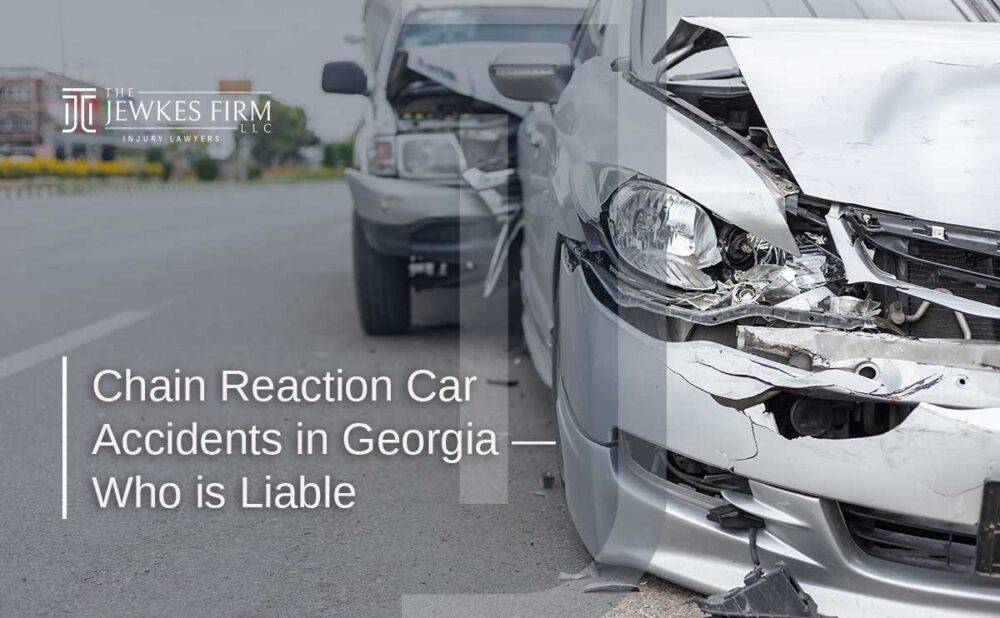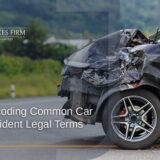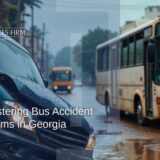Chain Reaction Car Accidents in Georgia — Who is Liable and What You Should Know
Chain reaction car accidents can turn an ordinary drive into a complex legal ordeal. These multi-vehicle collisions often occur in seconds but can lead to significant injuries, property damage, and complicated legal battles over liability. If you or a loved one has been involved in a chain reaction crash in Georgia, understanding how liability is essential for protecting your rights.
At The Jewkes Firm, Attorney Jordan Jewkes brings years of personal injury experience to help victims of complex traffic accidents get the justice and compensation they deserve. Here’s what you need to know about liability in chain reaction accidents in Georgia.
What Is a Chain-Reaction Crash?
A chain reaction accident—also called a multi-car or pile-up collision—involves three or more vehicles.
One driver stops or crashes, causing a domino effect that results in multiple vehicles being involved. These accidents often occur on highways like I-75 or I-285, especially during traffic congestion, heavy rain, or low visibility.
These incidents may occur under a variety of circumstances:
- Rear-end collisions. A driver fails to stop in time and hits the vehicle in front, pushing it into another vehicle.
- Sudden stops. A vehicle suddenly stops due to an obstacle or traffic, leading to a series of collisions.
- High-speed impacts. A high-speed crash can lead to multiple vehicles being affected, especially on highways.
Example: A driver stops abruptly on I-75. The second driver rear-ends the first, and a third driver crashes into the second vehicle due to the sudden stop. Determining who is legally responsible isn’t always straightforward.
Each impact can involve different causes, injuries, and fault.
Chain-Reaction Accidents — Georgia Crash Statistics
According to the Georgia Governor’s Office of Highway Safety, there were over 400,000 car crashes statewide in 2023, many of which involved multiple vehicles. The same year, Georgia recorded 1,615 motor vehicle deaths, about 14.6 per 100,000 population—near the national average. While chain‑reaction “pile‑ups” are not separately tallied, flawed clear‑distance following, aggressive driving, and poor weather are often implicated. Metro Atlanta counties like Fulton, Gwinnett, and Clayton are among the most affected by multi-car accidents.
Common contributing factors in these crashes:
- Tailgating
- Distracted driving
- Poor visibility (fog, rain)
- Speeding in congested traffic
Injured In A Car Wreck? Contact Us For A Free Consultation
Injured In A Car Wreck?

Who’s at Fault in a Chain-Reaction Car Accident? Understanding Liability in Georgia
Chain-reaction accidents—often called pile-ups—can turn a routine commute into a chaotic and costly disaster. Unlike a simple rear-end collision, these accidents involve multiple vehicles, layers of responsibility, and serious legal questions. At The Jewkes Firm, we help Georgia drivers make sense of this confusion and fight for the compensation they deserve.
Why Is Liability So Complex?
Chain‑reaction accidents are tricky because:
- Multiple impacts make it hard to identify who struck whom first.
- Comparative actions—like who braked, who tailgated, or who failed to stop—matter.
- External conditions (weather, road maintenance, mechanical failures) often play a role.
How Is Fault Determined in Georgia?
Determining liability in accidents involving multiple vehicles can be intricate. In Georgia, the legal principle of modified comparative negligence applies. This means that each party involved in the accident is given a percentage of fault. This blame can impact how much money they can get back for their losses.
Establishing liability in a chain reaction crash requires a detailed investigation. Key questions include:
- Which vehicle initiated the crash?
- Were any drivers speeding, tailgating, or distracted?
- Did road conditions contribute to the accident?
- Were multiple impacts involved, or was it a single collision?
In Georgia, the driver in the rear is generally presumed at fault for failing to maintain an assured clear distance. Exceptions to this rule include situations where another vehicle suddenly cuts in front, an unexpected pedestrian appears, or the vehicle gets pushed from behind, causing a secondary collision. Braking suddenly without a valid reason can lead to pile-ups. This careless or reckless behavior could make the driver responsible for shared or sole liability.
Police reports, eyewitness accounts, dashcam footage, and accident reconstruction experts determine fault.
Key Factors in Establishing Liability
- Negligence. To establish liability, one or more drivers must have acted negligently. Negligence can include behaviors such as distracted driving, speeding, or driving under the influence.
- Causation. It must be shown that the negligent actions of a driver directly caused the chain reaction. This can be challenging, especially when there are multiple vehicles involved.
- Comparative Fault. In Georgia, if you are found to be 50% or more at fault for the accident, you cannot recover damages. If your level of fault is less than 50%, your compensation will be adjusted downward by your percentage of fault.
Example Scenario
Consider a situation where Driver A is texting while driving and rear-ends Driver B, who then collides with Driver C. In this case:
- Driver A may be primarily liable for the initial collision due to distracted driving.
- Driver B may share some liability if they were following too closely or failed to brake in time.
- Driver C may also have a claim if they were not maintaining a safe distance or were speeding.
Each driver’s actions are scrutinized to determine the percentage of fault assigned to each party.

Common Causes of Chain Reaction Crashes
Some of the most frequent causes of multi-vehicle accidents in Georgia include:
- Distracted driving (e.g., texting or eating)
- Tailgating
- Sudden braking
- Speeding
- Poor weather or road visibility
- Mechanical failures
- Impaired driving
Identifying the initial negligent act is key to determining liability in these complex cases.
Who May Be Liable in a Chain-Reaction?
In a chain reaction crash, multiple parties may share responsibility:
- The Rear-Most Driver. In Georgia, rear-end collisions often presume fault on the part of the driver who crashed into another from behind. If you failed to maintain a safe distance, you could be held primarily responsible.
- Middle (Secondary) Drivers. If a car is pushed into another vehicle (a “sandwich crash”), they might share fault only if they were also tailgating or not paying attention.
- The First Driver. If the first car stopped without warning or had non-functioning brake lights, they may bear most of the blame.
- Vehicle Owners or Employers. If a commercial vehicle causes the crash, the employer or company that owns the vehicle could be held accountable.
- Local Government or Road Contractors. In rare cases, poorly designed or maintained roads may contribute to liability.
- Weather and Road Conditions. Georgia law may consider weather-related visibility or road maintenance issues, but these do not excuse negligent driving. Drivers are still expected to adjust behavior to conditions.
How Insurance Companies Handle Chain Reaction Accidents
Georgia requires all drivers to carry liability insurance. After a chain reaction accident, it’s essential to notify your insurance company and the insurance companies of the other drivers involved. However, be cautious when discussing the accident with insurance adjusters, as they may attempt to minimize your claim.
Insurance companies will often try to shift blame to reduce their financial exposure. It’s common for insurers to:
- Deny liability or claim shared fault
- Minimize injury claims
- Offer lowball settlements early on
Having an experienced car accident attorney like Jordan Jewkes on your side can ensure you’re not taken advantage of during this critical time.
Uninsured/Underinsured Motorist Coverage
Given the complexities of chain reaction accidents, it’s wise to consider uninsured/underinsured motorist (UM/UIM) coverage. This type of insurance can provide additional protection if the at-fault driver lacks sufficient insurance to cover your damages.
What Compensation Can You Recover?
If you’re hurt in a chain-reaction accident, you may recover damages for:
- Medical bills (emergency care, rehab, future treatment)
- Lost wages
- Pain and suffering
- Vehicle damage
- Punitive damages for gross negligence
At The Jewkes Law Firm, we analyze every detail of your case to determine fault percentages and hold the responsible parties accountable.
Need a Free Consultation? Need a Skilled Attorney?
Free Consultation
Call (770) 771-5130
If you’ve been injured, you need to hire the best legal care to assist you with your claim. Get a FREE consultation today!
Why You Need a Personal Injury Lawyer
How We Build Your Case
Chain reaction cases involve complex legal and factual questions. At The Jewkes Firm, we:
- Reconstruct the crash using expert witnesses
- Collect police reports, dashcam footage, and eyewitness accounts
- Work with accident reconstruction specialists
- Negotiate aggressively with insurers who try to shift the blame
- File a lawsuit when necessary to protect your right to compensation
We know how to navigate Georgia’s legal system and fight for the compensation you deserve, including medical expenses, lost wages, property damage, and pain and suffering.
You don’t have to handle this alone. Chain-reaction accidents can leave you hurt, confused, and unsure of who’s to blame. That’s where we step in.
Don’t Wait – Time Limits Apply
In Georgia, you generally have two years from the date of the accident to file a personal injury lawsuit. Delaying could jeopardize your claim or reduce your potential compensation.
What to Do After a Chain Reaction Accident in Georgia
If you’re involved in a chain reaction crash:
- Call 911 and seek medical attention.
- Document the scene—photos, witness contacts, and road conditions.
- Avoid admitting fault, even casually.
- Report the accident to your insurance company.
- Contact a personal injury attorney before speaking to the other party’s insurer.

GEORGIA PERSONAL INJURY LAWYER NEAR ME
Get Help From The Jewkes Firm Today
Chain reaction accidents in Georgia are legally and factually intricate. Liability relies on detailed evidence, with Georgia’s modified comparative negligence playing a pivotal role. If you’ve been injured in a chain reaction car accident in Georgia, don’t face the insurance companies alone. Contact The Jewkes Firm at (770) 771-5130 for a free case evaluation. We’ll help you untangle liability, fight the insurance companies, and work to get you the compensation you need to move forward.
Frequently Asked Questions
What is a chain reaction car accident?
A chain reaction car accident occurs when one vehicle collides with another, causing a series of collisions involving multiple vehicles.
Who is at fault in a chain reaction car accident in Georgia?
Fault is determined based on who initiated the chain of collisions. Multiple drivers may share liability depending on their actions, as Georgia uses a modified comparative negligence system.
Can more than one driver be held liable?
Yes. In chain reaction accidents, multiple parties may share fault. Even if you’re partially at fault, you may still recover damages if you’re less than 50% responsible.
What should I do after a multi-vehicle accident in Georgia?
Call 911, get medical help, document the scene, exchange information, and contact a personal injury lawyer before discussing fault with insurers.
Can I recover damages if I was partially at fault in a chain reaction accident?
Yes, in Georgia, you can recover damages if you are less than 50% at fault. However, compensation awarded may be reduced based on your percentage of fault.
Why is it important to consult a personal injury attorney after a chain reaction crash?
An attorney can investigate the accident, collect evidence, identify liable parties, deal with insurance companies, and fight for the compensation you deserve.
Is there a time limit to file a claim in Georgia?
Yes. Georgia's statute of limitations for personal injury claims is two years from the date of the accident. Don’t wait to consult an attorney.





